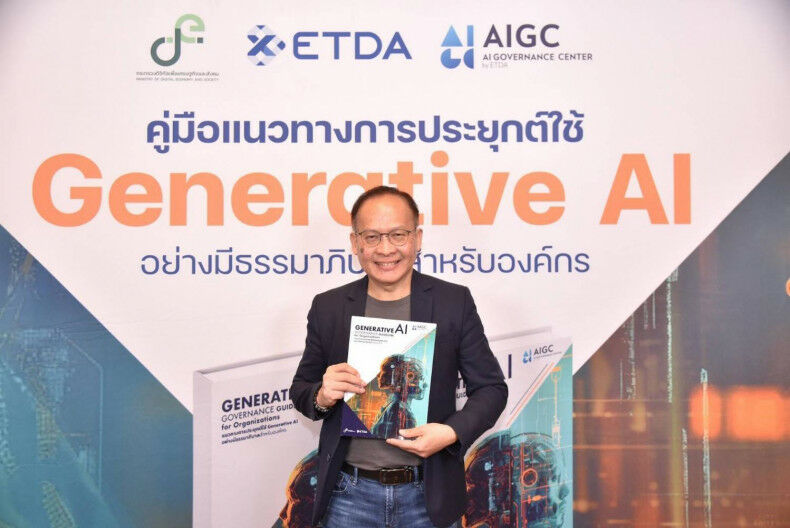Land of smart: Thailand’s AI ambitions set to smile on the future

Hold the front page! Thailand is making some serious waves in the world of artificial intelligence (AI). The Land of Smiles is rolling up its sleeves to become a key regional centre for AI training, partnering with the United Nations Educational, Scientific and Cultural Organisation (UNESCO).
This clever move is all about leading the charge in helping developing countries tackle AI ethics—a sector as cutting-edge as it is controversial.
The Thai government is seeking a thumbs-up from the Cabinet for an AI governance framework tailor-made for public agencies.
With its sights set firmly on harnessing AI’s potential, Thailand aims to get tech working in its favour across crucial sectors like healthcare, agriculture, education, energy, and finance, an announcement made with gusto by the Electronic Transactions Development Agency (ETDA), said Sak Segkhoonthod, senior advisor of the AI Governance Clinic at ETDA.
“AI represents the second era of digital transformation. It has more benefits than risks. However, it should be carefully used with responsible governance.”
However, it’s not all sunshine and rainbows. The AI scene, and in particular, its trailblazing branch, generative AI (GenAI), comes with a cocktail of risks: bias, ethical conundrums, privacy scares, security issues, and copyright dilemmas.
AI strategy
Sensible governance is key, and organisations need to lay down robust structures for AI strategy, risk management, and operations. Selecting the right AI tool isn’t just about tech; it involves trusting vendors with responsible terms, conditions, and ethical backing.
In a bold statement of intent, Thailand’s Higher Education, Science, Research and Innovation Ministry, alongside the Education Ministry, is buddying up with Unesco to host the first-ever Asia-Pacific international conference titled Unesco Global Forum for the Ethics of AI 2025 in Bangkok.
Slated for June 24-27 next year, this event, under the banner Ethical Governance of AI in Motion, aims to catapult Thailand to the forefront of the global AI ethics debate, said Sak.
“Thailand wants to collaborate with Unesco to establish the AI training centre to help developing countries in the region sustainably embrace AI.”
The ETDA plans to roll out AI governance blueprints to the cabinet, propelling the public sector to the cutting edge. Even more sizzling is their recent release of GenAI governance guidelines, designed to ramp up organisational savvy in GenAI advancements.
While Thailand hasn’t yet penned AI-specific laws, fearing that overly strict controls might clip the fast-moving tech’s wings, there are already governance guidelines for both public and private sectors. In certain areas like healthcare, there’s chatter about potential regulations.
AI challenges
Meanwhile, existing statutes on personal data protection, intellectual property, and computer crime are standing in as makeshift gatekeepers for AI-related challenges.
Sak cited the AI Readiness Measurement 2024 survey, showing a jump in AI adaptation among Thai firms, with uptake climbing from 15.2% in 2023 to a cool 17.8%. In fact, 73.3% of enterprises are gearing up to embrace AI, with education, finance, commerce, and logistics leading the charge.
Despite this growth spurt, only a paltry 16.5% of organisations incorporated AI ethics into their action plans, but there’s hope yet, that 43.7% are starting to toy with the idea of ethical integration.
Rojana Lamlert, advisor and team leader of the AI Governance Clinic at ETDA, chimed in, noting the global spotlight on ethical AI use and governance is set to burn even brighter next year. Countries worldwide are sitting up and taking notice of both the opportunities and the risks bubbling up from the depths of GenAI.

Frequently Asked Questions
Here are some common questions asked about this news,
Why is Thailand keen on becoming a regional AI training hub?
Thailand aims to lead AI ethics and governance discussions, supporting sustainable AI adoption in developing countries.
How might AI governance impact Thailand’s public sector initiatives?
AI governance could streamline solutions in healthcare, agriculture, and finance while ensuring ethical AI use.
What if Thailand’s AI governance framework becomes a model for other nations?
It could position Thailand as a global leader in ethical AI deployment, influencing international AI policies.
How can Thailand balance AI innovation with potential ethical risks?
By implementing responsible governance frameworks and adapting existing laws to address AI-specific challenges.
What role does the ‘Unesco Global Forum for the Ethics of AI 2025’ play in Thailand’s AI ambitions?
The forum showcases Thailand’s commitment to ethical AI, fostering global dialogue on governance challenges.
Latest Thailand News
Follow The Thaiger on Google News:


























